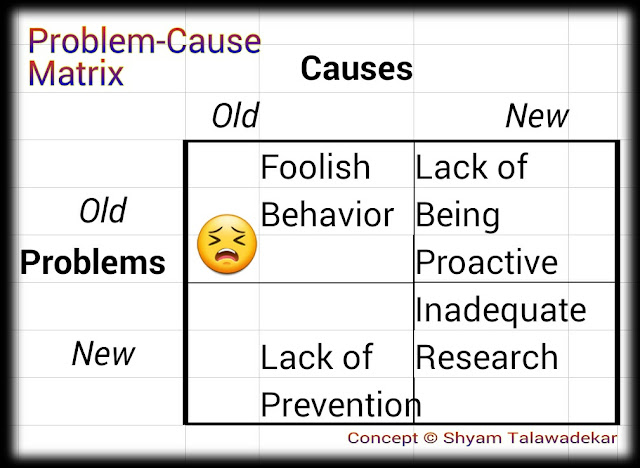Business of the company that I went to assess was driven by research and development (R&D), high obsolescence of products and uniquely varying needs of customers.
High customisation was the order of the day. That in turn called for high level of customer contact and listening skills in order to capture voice of customer (VOC) precisely. This obviously calls for leadership skills to get it made in-house and get delivered before competition could do.
The need may appear unique to the company. But this in fact is the order of the day for most suppliers given the ever dynamic market place characterised by VUCA¹ and high level of competition.
While CEO of the company was keen to improve business processes to help retain their position externally, simultaneous concern was about 'attrition' he had been facing. Recently 'bought' talent also left, he complained.
Won't the training go waste under such circumstances, he feared.
Between the trained people leaving and untrained ones living (with you) for ever with their errors to annoy you, what is better?
Education, training and coaching builds people. Between 'Building' relevant skills captively versus installing 'Bought' skills as a foreign particle, what is preferable?
Companies need to understand that building pipelines of people is no less important alongside building the pipelines of products. In fact the former should be their prime agenda.
Why do people quit?
Especially those with high aspirations definitely do.
In fact, those without aspirations too move in absence of a conducive environment to hold them back. One of the major reasons of the other party leaving is indifferent treatment be it to people in general or to a customer in particular.
So one of the most important portfolios of the CEO is not to leave HRD² to HR-D (HR-Department). Instead, creating culture that 'compels' people to stay back should be her hands-on agenda driven personally.
One can't ignore the fact that even seemingly dumb people have intelligence, so-called average though. It usually stays latent or dormant until challenged.
Leaving aside their own ego, superiors just need to facilitate unleashing it by making them feel confident and help them to realise their self-worth. They just need to be given an opportunity and a platform to shine. This can be done by encouraging them to express their thoughts, experiment corresponding changes in their work area without fear-of-failure.
It's a process of enabling³ people.
Once done, latent talent can be seen flowering and flowing-in smoothly. The pipeline of HRD can be seen getting 'built' that not only ensures employee retention but also creates a pull.
How to enable³ people?
First of all collect (Not Buy!) people who have fire-in-their-belly although with not-very-high aspirations and high-qualifications. Then enable³ them step-by-step.
Step-1. Establish your credibility by demonstrating your actions on what you speak.
Step-2. Explain your expectations from them. Communicate your urgency and seriousness through complimentary evidences.
Step-3. Educate, train and coach them.
Education is to help them acquire goal specific knowledge.
Training is to help them acquire goal specific and industry-relevant, organisation-specific skills.
Coaching is to help them on 'Do-Why' and 'Do-How' in order to apply the knowledge and skills to enthusiastically achieve the goals of common good.
Step-4. Encourage, inspire & motivate to keep them engaged in the process. Give them a platform to showcase their talent and to shine.
Step-5. Empower them: Give them freedom-within-a-framework to experiment without fear of failures.
Step-6. Ennoble, means dignify them with high respect. Recognize & reward their achievements by actively listening to their efforts.
Step-7. Repeat the enablement cycle to take up higher challenges.
'Building' people rather than 'Buying' them is in a true sense creating a learning organisation as companies like Toyota do. It's their company level strategy driven by the top rather than merely a HRD² strategy left to the HR-D.
Footnotes:
1. VUCA: Volatile, Uncertain, Complex, Ambiguous. A term of military origin that represents warfare environment.
2. HRD: Human Resource Development.
3. Model 7-E© from Book "How To Enable A Change Process? Start-From-Self". Author: Shyam Talawadekar.
Also read a few relevant blogposts hereunder: Please do consider leaving a comment or sharing this post.
Taken-For-Granted ? You Deserve It !!
Strategise To Achieve Targets Daily
Does recognition really matter
IQ-EQ-or-SQ: What-is-more-important?
Do you know a Best-Career-Plan
Take your career in fast lane!
Succession-Plans In Fast Lane!
Treat Root-causes, Not Symptoms !
Nauseous Communication Gaps
Do You Cleanup-After-Crisis
Raam or Krishna-Shyam: Tell me Hey Raam!
Will It Work Here?
Some Moron ! Some Great !!!
That's How Morons Work
You seem Reasonable if you appear Un-reasonable
Smart-Moron Who Breaks Your Glass
WOW Work-Culture: By Telling or Selling
Suggestions On-Sale, None-To-Buy
Can-changing-thoughts-change-a-nation
Ridiculous Poison-culture versus Maverick Kaizen-culture
Tolerate Once, Twice, Thrice?
Make checklists your friends
Make It Simpler, Rest Will Follow
How To Make A Difference
Big-Be Or Bug-Be !
A customer gets what s/he deserves: Shoddy Quality!
Listen to iceberg of VOC to acquire customers











